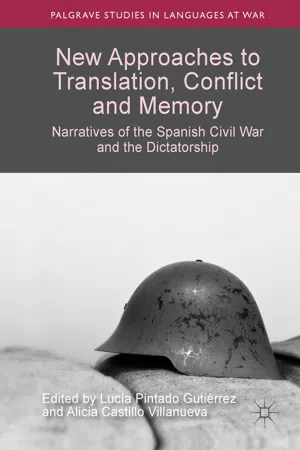New Approaches on Translation , Conflict , and Memory: Narratives of the Spanish Civil War and the Dictatorship is a collection of essays that endeavours to establish a new dialogue between translation, conflict, and memory studies. Focusing on cultural representations of the Spanish Civil War and the Franco Dictatorship, it explores the significance and the effect of translation within Spain and beyond. Drawing on fictional and non-fictional texts, reports from war zones, and audiovisual productions, the contributors to this volume examine the scope of translation in transmitting the conflict and the dictatorship from a contemporary perspective. Narratives produced during and after the Civil War and the dictatorship both in Spain and abroad have led to new debates arising from the reassessment of a conflict that continues to resonate.
This book emerges from the common ground shared by our different academic interests, particularly in translation and historical memory studies, but also from an ethical commitment to justice, truth, and moral reparation for those who were erased from the official history and relegated to oblivion. Translation, conflict, and memory taken together, form an emerging field that bridges the gaps between these disciplines within Spanish studies in order to provide a solid background for further analysis and research. This book aims to give visibility to a field that still has to be studied in greater depth and which has the potential to occupy a significant position on a bigger map that depicts other narratives of conflict and translation.
During the Spanish transition to democracy, political leaders decided that, with a view to uniting the country and directing its path towards the new system of governance, some of the more problematic aspects of Spanish history of the previous five decades might be best papered over. The decision was taken not to prosecute those who had committed serious crimes; instead perpetrators were tacitly pardoned under an amnesty law passed in 1977 which was supported by the majority of the political spectrum. The legacy of the Civil War and Franco’s repression was a delicate subject and to avoid the reopening of old wounds, both conservative and socialist governments proceeded with extreme caution. The collective determination to re-establish democracy by whatever means were necessary led to what would be known as the Pact of Forgetting, a curtain of silence over the past (Preston 2007: 19). Thus, the politics of memory in the transition to democracy have been described as the elimination and eradication of historical memory and a forgetting and silencing of the past (Morán 1991; Medina 2001; Labanyi 2007; Colmeiro 2011).
The Pact of Forgetting (1977) implied in turn the tacit suppression of the Republican memory and identity in both the political and public spheres (Ryan 2009). Discussion was impeded between the generations who experienced, in one way or another, this episode in Spanish history, and this has led to a debate at all levels in contemporary Spain. This reassessment has taken place in various areas of society, culture, and politics in order to recover the memory of the defeated and to complete the untold stories and the hidden history of the conflict. Therefore, historical memory in this context consists in recovering in the public space the memory of the violence suffered by the victims of the dictatorship marginalized in the collective story, but above all it claims justice, truth, and reparation for the victims of Francoism (Saz 2003: 56). Gálvez Biesca points to the political triumph of the conservative People’s Party (PP), and specifically the government of José María Aznar (1996–2004), as the onset of the increasing socio-political sensitization and the revival of historical memory (2006: 27).
In the past few decades, the tireless efforts by different associations to give recognition to the
victims of Franco’s repression have made remarkable progress. The work carried out by the
Association for the Recovery of Historical Memory and the passing of the controversial
Historical Memory Law in 2007 under the socialist
government of José Luis Rodríguez Zapatero led to the search for, and recovery of, the remains of
victims of the
Francoist repression. These events coincided with the commemoration in 2005 of 30 years of democracy and in 2006 with the 70th anniversary of the beginning of the
war, which increased general interest and debate. Both media and literary criticism have considered this phenomenon to be a “journey back from amnesia” following the title of an article by journalist Javier Valenzuela that many critics have echoed:
It took over 25 years for democracy to confront the post-war period. Bookstores have become filled with works by historians, essayists, journalists, and novelists who give voice to the millions of Spaniards who lived a sorrowful inner exile following the Civil War. (Valenzuela 2002—our translation)
What Valenzuela describes has resulted in a growth in popular awareness of the “right to memory,” so that those who were denied this right to remember might be granted recognition (Castilla del Pino 2006: 16). This has brought with it a debate that embraces the rights of the individual and the community, a discussion that grants visibility for families seeking their relatives, a public discourse in literature, cinema, and other cultural channels. According to authors such as Dulce Chacón, Santos Juliá, or Javier Cercas, this growth in awareness seems to correspond to an interest awakened among the new generation and the grandchildren of survivors (Valenzuela 2002). Recent Spanish fiction has focused on questions of memory in a new perspective, questions that differ from those which dominated public discourse previously in the ways in which they relate to current debates about the appropriate memorialisation of the recent past (Leggott 2015: 1). These narratives bring previously silenced Republican stories into the public domain, acknowledging the victims of nationalist repression, persecution and extra-judicial killings during ...
